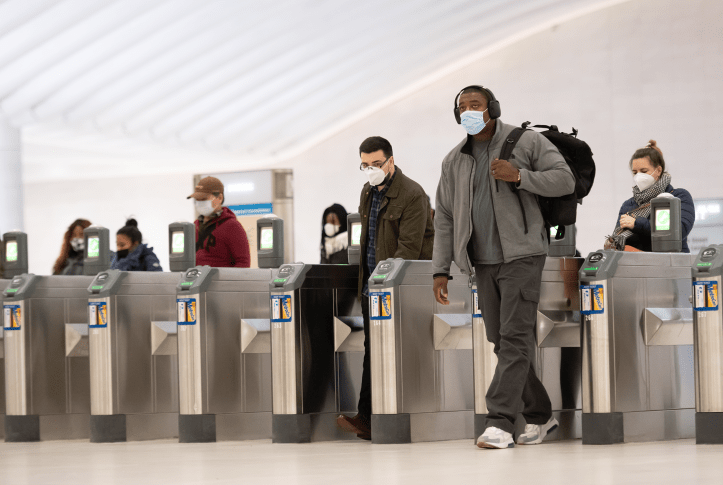Federal Judge Eliminates the CDC’s Public Transportation Mask Mandate
For more than a year, Americans traveling by train, plane, bus, or other public transport have been required to wear masks to prevent the spread of COVID-19. Most Americans have supported this mandate. On April 18, a federal judge in Florida ended the mandate for the country. Her decision raises a question: Who should be in charge of public health decisions affecting the American people — scientific agencies designated by Congress or unelected federal judges?
The case, Health Freedom Defense Fund v. Biden, was brought by two individuals who claimed to have anxiety or panic attacks caused by wearing masks and by an anti-COVID-regulation organization. The judge, Kathryn Mizelle, was rated “not qualified” by the American Bar Association when she was nominated by President Trump in the final days of his administration because of the short time she had been in practice and her lack of courtroom experience.
The CDC’s Authority
The plaintiffs argued that the Centers for Disease Control and Prevention (CDC), which had issued the mask mandate, has no congressional authorization to do so. A 1944 statute empowers the CDC “to make and enforce such regulations as in [its] judgment are necessary to prevent the introduction, transmission, or spread of communicable diseases from foreign countries into the States . . . or from one State . . . into any other . . . State.” The statute lists applications of this authority: for instance, the CDC “may provide for such inspection, fumigation, disinfection, sanitation, pest extermination, destruction of animals or articles found to be so infected . . . and other measures, as in [its] judgment may be necessary.”
Judge Mizelle read these examples as limiting rather than illustrating the authority of the CDC. This limited interpretation is how the Supreme Court read the statute last year when it allowed a court decision blocking the CDC eviction prohibition to go into effect. But requiring masks is more directly related to stopping the transmission of disease than an eviction prohibition. The government argued that requiring masks was a “sanitation” measure because it keeps the air clean. The judge however, examined dictionaries and word usage from the 1940s and concluded that sanitation means active cleaning, while recognizing that the word also referred to measures that maintained cleanliness at the time the law was adopted. She also contended that all the measures listed in the statute deal with things and not people. Since she acknowledged, however, that “sanitation” does have two meanings, she did not need to choose the more restrictive meaning that hamstrings the CDC.
The government asked the judge to defer to the CDC’s interpretation of the statutes, but she said the statute was clear. She relied in part on the “major questions” doctrine. Under this doctrine, increasingly relied on by conservative judges to limit the power of the federal government, agencies may not decide questions of “vast economic or political significance” without explicit congressional authorization. By allowing courts to decide which questions are major and whether congressional authorization is specific enough, this doctrine effectively moves decision-making authority from the agencies to the courts. Congress can, of course, enact new laws, but must Congress act each time we face a new public health threat?
Procedural Problems
Judge Mizelle further ruled that the promulgation of the order violated the Administrative Procedure Act. Agencies must offer the public notice and an opportunity to comment before making a rule. Agencies may skip this if they can show “good cause.” The government argued that the COVID emergency required avoiding the delay associated with the notice and comment process, which can take months. She rejected this argument and held that the CDC’s order was arbitrary and capricious because it failed to consider alternatives to masking and allowed exceptions to the rule — for example, for infants or when eating. The CDC cited a number of studies showing the effectiveness of masking and discussed alternatives that were not viable for public transportation, like social distancing or vaccination.
Judge Mizelle issued a nationwide order vacating the mandate. Almost immediately, airlines lifted their mask requirements. Passengers were told in midair that they could remove their masks. Many found this a great relief. Others — with children too young to vaccinate or suppressed immune systems — were disturbed. The government has appealed the judge’s ruling but has not asked the appellate court to block the order. As a practical matter, it is difficult to see the mandate being reimposed any time soon.
Passengers may still wear masks, but much of the benefit of masking comes from keeping particles from entering the air, which requires all parties to be masked.
Who Should Decide Public Health Protections?
The CDC would probably have allowed the mandate to expire soon in any event, so the practical effect of the order is not clear. What is concerning, however, is that the decision completely ignored the scientific basis of the rule. The judge did not hear expert witnesses. She decided the case solely based on the meaning she attributed to the word “sanitation” and her beliefs in the inadequacy of the administrative record.
Nearly a million Americans have died of COVID. Although COVID cases, hospitalizations, and death are lower now, we do not know when the next variant or epidemic may strike or how serious it will be. Do we really want the federal government’s power to address the next epidemic to be constrained by a judge’s preferred reading of an 80-year-old dictionary?

